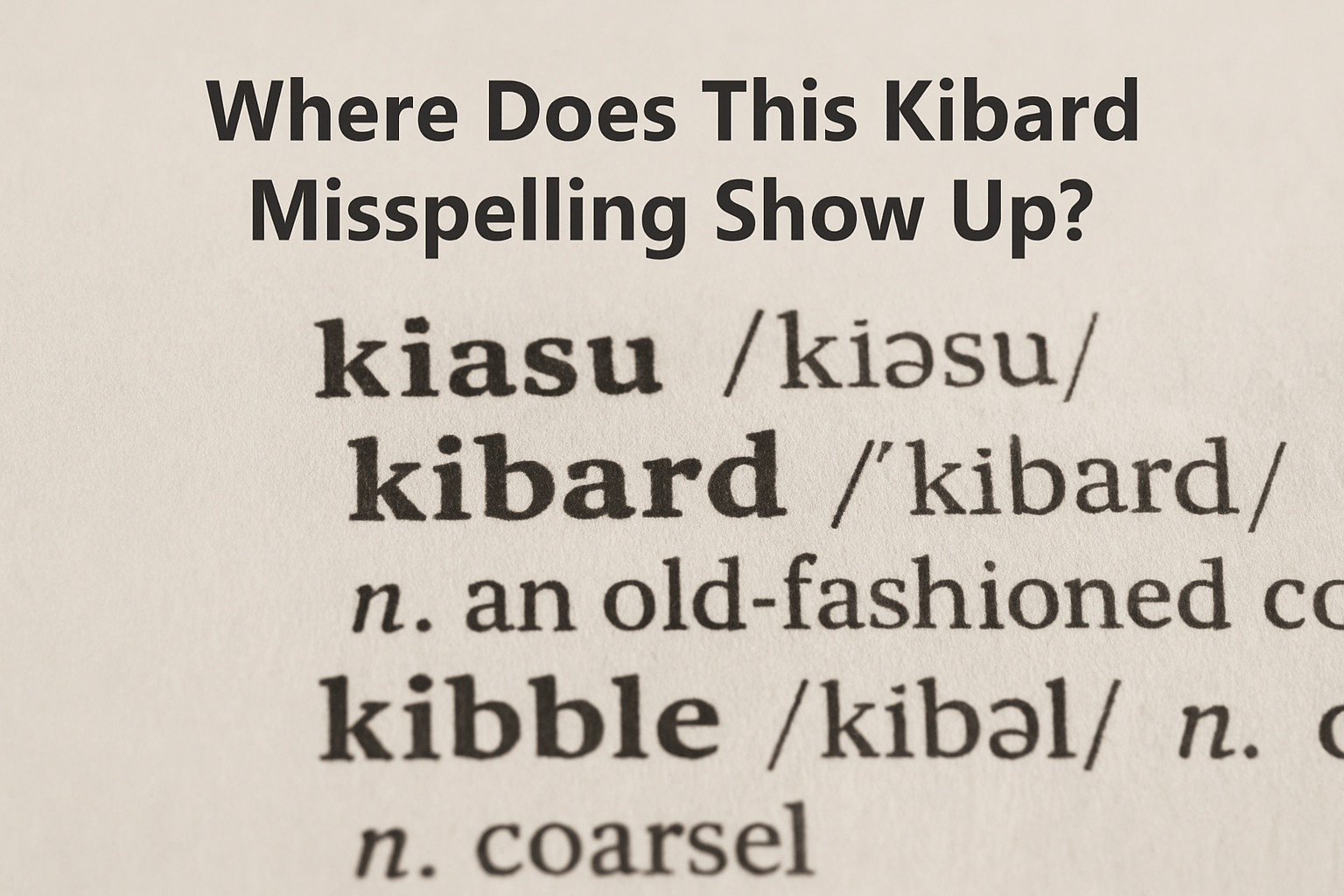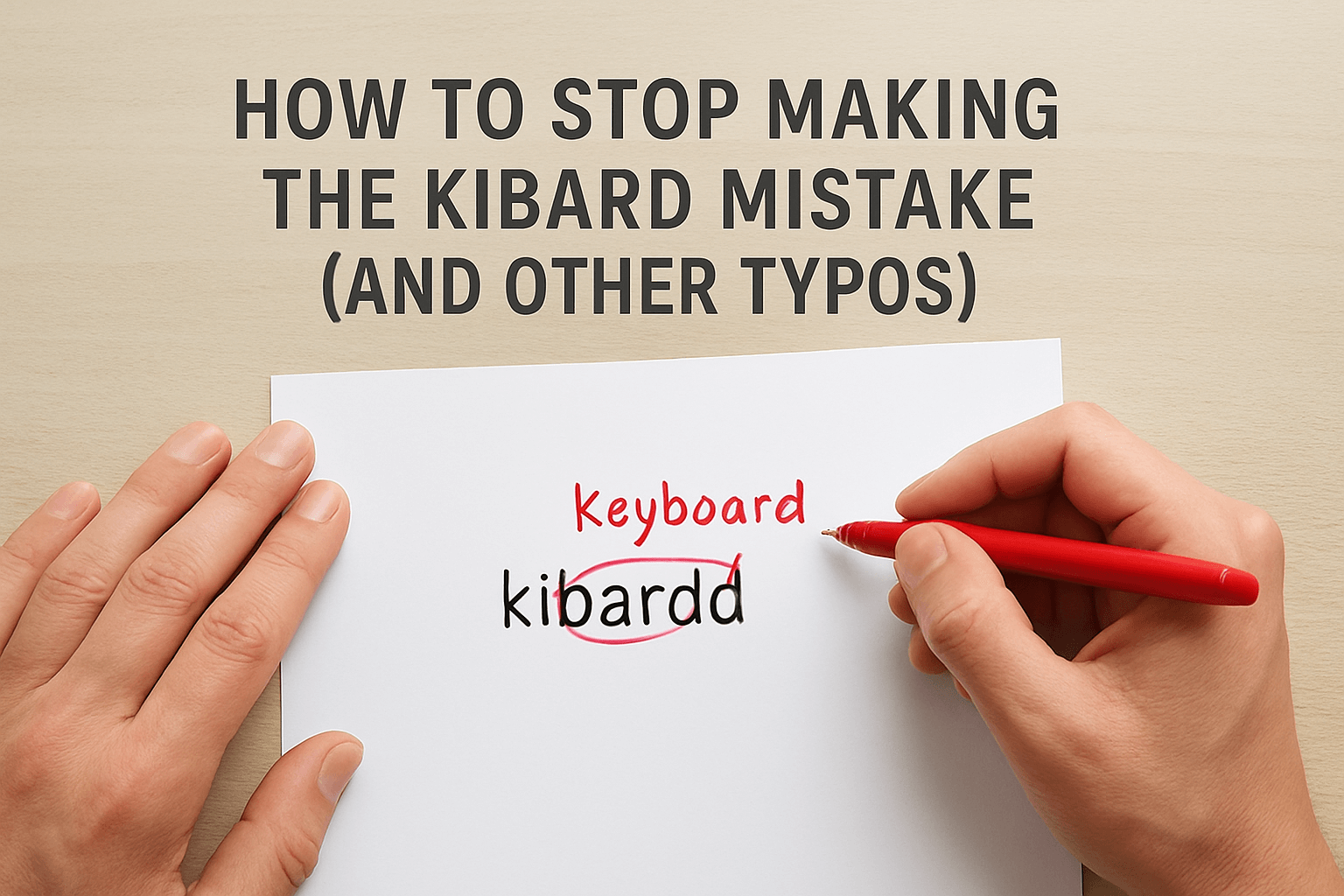You know what’s funny? I bet at some point, you’ve typed “kibard” instead of “keyboard” and didn’t even notice until autocorrect jumped in. Don’t worry – you’re in good company. This simple keyboard typo happens to thousands of people every single day, and honestly, it tells us a lot about how we type and work in today’s digital world.
So let’s dive into this kibard thing and figure out why it matters more than you might think.
What Exactly Is Kibard?
Okay, so kibard is basically just a misspelling of keyboard. Pretty straightforward, right? But here’s where it gets interesting – this isn’t just some random typo that one person makes. It shows up everywhere. I’m talking medical records, business documents, company websites, even music databases.
Think about it. When was the last time you were typing super fast and your fingers just… got mixed up? That’s exactly what’s happening here.
Why Do We Keep Typing Kibard?
There are a few reasons why this keyboard mistake keeps popping up:
Our fingers are on autopilot – When you’re typing quickly, your brain is thinking faster than your fingers can move. Sometimes the letters get jumbled.
The keys are right next to each other – Look at your keyboard right now. The “e” and “a” keys are pretty close, aren’t they? When you’re moving fast, it’s easy to hit the wrong one.
Phone keyboards are tiny – Ever tried typing on your phone while walking? Yeah, good luck with that. Those small touchscreens make typing errors like kibard super common.
Autocorrect can be weird – Sometimes your phone or computer “learns” the wrong spelling and keeps suggesting it. Before you know it, kibard is saved in your dictionary.
Here’s something that’ll blow your mind: studies show that almost 1 in 4 medical data entry mistakes come from simple keyboard typos. That’s huge when you think about it.
Where Does This Kibard Misspelling Show Up?

In Doctor’s Offices and Hospitals
This one surprised me too. Healthcare workers are busy people, right? They’re typing patient information quickly, and sometimes kibard slips into:
- Patient files and electronic records
- Administrative paperwork
- Medical transcription software
- Hospital database systems
And get this – when doctors use voice-to-text software with background noise or different accents, the system sometimes hears “keyboard” but writes “kibard.” Then that mistake gets copied into multiple documents. Not great when you’re dealing with patient care.
In Business and Company Records
You’d think professional companies would catch these typing mistakes, but nope. Kibard appears in:
- Official company databases
- Business websites and blogs
- Email communication systems
- Corporate documents and reports
Once a misspelling gets into an official database, it can stick around for years. I’ve seen company websites with this typo sitting there in plain sight, and nobody’s caught it yet.
In Music Catalogs
Here’s a fun one. Music platforms like Discogs have artist entries with names like “Deek Kibard” – and nobody’s quite sure if that’s intentional or just a keyboard error that became permanent. Either way, it messes up search results and splits artist profiles.
Why Kibard Actually Matters for Google and SEO
How Google Handles Keyboard Typos
When someone types kibard into Google, the search engine is pretty smart about it. It usually says, “Did you mean keyboard?” But here’s the thing – if your website has this misspelling, you might be losing visitors without even knowing it.
Pages with common spelling mistakes get about 8% less traffic than properly spelled ones. That might not sound like much, but if you’re running a business, that’s potential customers you’re missing.
The Sketchy Side: Typosquatting
Okay, this gets a bit darker. Some shady people actually register website domains with common typos like kibard. Why? Because when someone makes a typing mistake, they end up on the wrong site. These fake sites can:
- Steal your personal information
- Try to scam you with fake products
- Install malware on your computer
- Trick you into giving away passwords
It’s called typosquatting, and it’s a real problem. So yeah, understanding these keyboard misspellings isn’t just about grammar – it’s about staying safe online.
Why Our Brains Make These Keyboard Mistakes
Let me explain this in simple terms. Your brain is amazing, but it’s not perfect. Here’s what happens:
You’re trying to go fast – When you prioritize speed over accuracy, mistakes happen. Your fingers are literally racing to keep up with your thoughts.
You’re doing multiple things – Ever tried typing an email while someone’s talking to you? Your brain is split between tasks, so typing errors increase.
Fat fingers are real – On phones especially, it’s easy to hit two keys at once. We’ve all been there.
Muscle memory kicks in – Sometimes your fingers just “remember” the wrong way to type something, and boom – kibard appears again.
Your Keyboard Layout Makes a Difference
The standard QWERTY keyboard (you know, the one basically everyone uses) actually creates predictable typing mistakes. Letters that are next to each other get swapped more often. So kibard happens because of where those keys sit.
Some people use different keyboard layouts like DVORAK, which supposedly reduces errors. But let’s be honest – most of us aren’t switching anytime soon.
How to Stop Making the Kibard Mistake (And Other Typos)

For Companies and Organizations
If you’re running a business, here’s how to keep keyboard errors out of your systems:
Set up automatic checks – Use software that catches spelling mistakes in real-time as people type.
Use dropdown menus – Instead of having people type everything manually, give them options to click. Less typing = fewer mistakes.
Check your databases regularly – Schedule monthly or quarterly reviews to find and fix misspellings like kibard before they spread.
Train your team – Spend 30 minutes teaching employees about typing accuracy. It’s worth it.
For Regular People Like You and Me
Want to reduce your keyboard mistakes? Try these simple tricks:
- Slow down a bit – Seriously, just pause for half a second longer. It helps.
- Turn on spell check – Use it everywhere – emails, documents, even text messages.
- Review before hitting send – Quick read-through catches most typos.
- Learn proper typing – Those old-school touch typing lessons actually work.
- Take breaks – Your accuracy drops when you’re tired. Rest your hands and eyes.
What Technology Can Do
Modern spell checkers are pretty impressive now:
- They catch typos instantly and suggest fixes
- They learn your personal typing patterns
- They work across your phone, computer, and tablet
- You can add custom words for technical terms
The trick is actually paying attention to those red underlines instead of ignoring them.
What Keyboard Typos Really Cost Us
The Money Side
Here’s something most people don’t think about: typing mistakes cost real money.
Once a misspelling like kibard gets into multiple systems, fixing it is expensive and time-consuming. Plus:
- Your professional reputation takes a hit when clients see typos
- Your website ranks lower on Google with spelling errors
- Customers trust you less when your content has mistakes
Legal Stuff Gets Complicated
In some industries, keyboard errors can cause serious problems:
- Medical typos might lead to wrong medications
- Contract mistakes can create legal disputes
- Government filing errors cause compliance issues
- Audit documentation gets messy with misspellings
Yeah, it’s not just about looking professional – sometimes it’s about staying out of trouble.
Kibard in the World of Voice-to-Text and AI
How New Technology Helps
The cool thing is, technology is getting better at fixing our typing mistakes:
- AI can understand context and catch errors we’d miss
- Predictive text reduces how much we actually have to type
- Voice-to-text lets us skip the keyboard entirely sometimes
- Smart spell checkers learn from our habits
But It’s Not Perfect Yet
Even with all this fancy tech, kibard and similar misspellings still happen because:
- Voice recognition struggles with accents and noisy backgrounds
- Autocorrect sometimes creates NEW mistakes while “fixing” old ones
- We rely too much on technology and stop proofreading
- Technical words and names often aren’t in the dictionary
What’s Next for Keyboards and Typing?
Cool New Keyboard Technology
Companies are working on some interesting solutions:
Vibration feedback – Your keyboard buzzes when you press a key correctly, helping prevent mistakes.
Smart keyboards – They learn how YOU type and adjust to reduce YOUR specific errors.
Gesture typing – Swiping instead of tapping might replace traditional keyboard typing someday.
Brain-computer interfaces – Sounds like sci-fi, but some companies are actually working on typing with your thoughts. No keyboard typos if there’s no keyboard, right?
Teaching Better Digital Skills
The real long-term fix is education:
- Schools should teach proper typing skills early
- Awareness campaigns about common mistakes help
- Professional training reduces workplace errors
- Personal accountability makes everyone more careful
What Kibard Teaches Us
Look, the kibard misspelling seems silly at first. But it actually shows us something important: even in 2025, with all our technology, human typing errors are still a real challenge.
Understanding why these keyboard mistakes happen – and how they spread through professional systems – helps us do better. Whether you’re a doctor entering patient data, a business owner updating your website, or just someone sending emails, being aware of typos like kibard makes you more careful.
It’s not about being perfect. It’s about paying attention and using the tools we have to reduce mistakes.
Bottom Line
- Kibard is a super common keyboard typo that shows up in medical, business, and entertainment fields
- These typing mistakes cost time, money, and credibility
- Simple habits and technology together can prevent most errors
- Understanding patterns helps us create better systems
- The future combines human awareness with smart AI tools
So next time you catch yourself typing kibard instead of keyboard, just laugh it off, fix it, and move on. We’re all human, and our fingers get confused sometimes.
